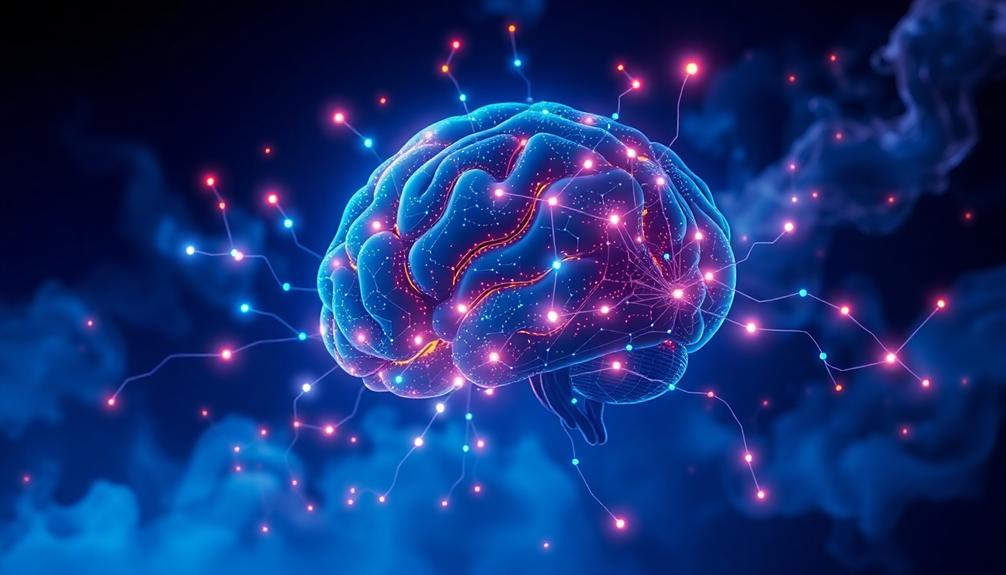You’re probably no stranger to the growing role of AI tools for content creation. In 2024, these tools have become even more sophisticated, allowing you to produce high-quality content more efficiently. You can now use AI-powered writing tools to generate engaging articles, optimize your content strategy with in-depth audience insights, and refine your writing with advanced editing software. As AI continues to transform the content creation landscape, you’ll want to know which tools can help you stay ahead of the curve – and what implications they have for your work as a writer.
Contents
- 1 Notable Key Points
- 2 AI-Powered Content Writing Tools
- 3 Content Research and Organization
- 4 AI-Driven Editing Software Options
- 5 AI Content Generation Platforms
- 6 AI-Assisted Content Localization Tools
- 7 AI-Based Content Analysis Solutions
- 8 Natural Language Generation Tools
- 9 Frequently Asked Questions
- 9.1 What Are the Costs Associated With Using AI Content Creation Tools?
- 9.2 Can Ai-Generated Content Replace Human Writers and Editors Entirely?
- 9.3 How Do AI Content Creation Tools Ensure Content Originality and Uniqueness?
- 9.4 Are AI Tools For Content Creation Compatible With Existing Content Management Systems?
- 9.5 What Are the Potential Risks and Challenges of Relying on Ai-Generated Content?
Notable Key Points
- AI-powered content writing tools can generate high-quality content comparable to human outputs, but raise concerns about authorship rights and misinformation.
- AI tools enhance content research efficiency by identifying relevant topics and trends, and providing audience insights for effective content strategies.
- AI-driven content generation platforms, including writing assistants and content generation software, can automate high-quality content creation and optimize SEO.
- AI-assisted editing software options, such as Grammarly and ProWritingAid, offer automated proofreading and editing suggestions to refine content quality and style.
- AI-assisted content localization tools enable automated translation, subtitling, and customization of content for global audiences, with real-time feedback mechanisms.
AI-Powered Content Writing Tools

One of the primary applications of AI in content creation is its ability to power content writing tools. When it comes to unlocking AI potential, these tools are revolutionizing how we approach digital content creation. You’re likely familiar with these tools, which leverage AI algorithms to generate written content, such as articles, blog posts, and even entire books. As AI writing trends continue to evolve, you can expect these tools to become increasingly sophisticated, capable of producing high-quality content that rivals human writing.
However, you should also be aware of the ethical considerations surrounding AI-powered content writing tools. For instance, there are concerns about authorship and ownership, as well as the potential for AI-generated content to be used for malicious purposes, such as spreading misinformation. As you explore the capabilities of AI-powered content writing tools, it is important to examine these ethical implications and confirm that you’re using these tools responsibly.
Content Research and Organization
Delving deeper into the domain of AI-powered content creation, a critical component that complements writing tools is content research and organization. You can’t create engaging content without understanding your audience, their needs, and industry trends. AI content tools have revolutionized how creators develop and optimize their work, making the process more efficient and data-driven. AI tools for content research help you discover relevant topics, curate content, and gain audience insights. They also enable keyword optimization, competitor analysis, and trend identification to make your content more impactful.
When it comes to organization, AI tools facilitate content mapping, which allows you to visualize your content strategy and allocate resources effectively. By analyzing your existing content, AI tools can identify gaps and suggest new topics to cover. You can also use AI to categorize and prioritize content, streamlining your workflow and ensuring consistency across all channels. By leveraging AI for content research and organization, you’ll save time, increase productivity, and ultimately create more effective content that resonates with your target audience.
AI-Driven Editing Software Options

Building on the foundation of AI-powered content research and organization, the next step in streamlining your content creation process is leveraging AI-driven editing software. Unlocking creative potential through artificial intelligence has revolutionized how content creators approach their editing workflow. With these advanced tools, you can refine your content, ensuring error-free and polished outputs. AI-driven editing software utilizes machine learning algorithms to provide intelligent grammar and syntax suggestions, improving the overall clarity of your content.
You can tap into the following AI-driven editing software options to elevate your content game:
- Automated proofreading: Grammarly’s AI-powered editor, which checks grammar, spelling, punctuation, and syntax in real-time.
- ProWritingAid’s extensive editing tool, which offers grammar and syntax suggestions, as well as style and structure recommendations.
- Ginger’s language translation and editing platform, which provides rephrasing and proofreading capabilities.
- LanguageTool’s open-source proofreading software, which supports multiple languages and grammar styles.
- Reverso’s suite of writing tools, which includes a grammar and spell checker, dictionary, and thesaurus.
AI Content Generation Platforms
You’ll likely encounter two primary types of AI content generation platforms: AI writing assistants and content generation software. AI writing assistants focus on augmenting your writing capabilities, offering suggestions and automating tasks such as research and organization. Content generation software, on the other hand, can create content autonomously, such as generating articles, product descriptions, or social media posts based on predefined parameters.
AI Writing Assistants
Leveraging advanced natural language processing (NLP) and machine learning algorithms, AI writing assistants have emerged as a critical component of content creation, revolutionizing the way writers, marketers, and businesses generate high-quality content. You can now rely on these tools to help you produce engaging, well-structured content that resonates with your target audience. With AI writing assistants, you can streamline your content creation process, saving time and effort.
Some key features of AI writing assistants include:
- Automated brainstorming: Generate ideas and topics based on trends, keywords, and industry analysis
- Voice recognition: Use voice commands to create and edit content, making the process more accessible and efficient
- Content suggestions: Receive recommendations for improvement, guaranteeing your content is optimized for SEO and user engagement
- Grammar and spell checking: Confirm error-free content with advanced proofreading capabilities
- Style and tone analysis: Analyze and adjust the tone and style of your content to suit your brand’s voice and audience preferences
Content Generation Software
Generating high-quality content at scale has become a crucial challenge for businesses and marketers, and that’s where content generation software comes in. You can use these AI-powered platforms to automate your content creation process, guaranteeing consistent quality and efficiency. With their advanced algorithms and natural language processing capabilities, content generation software can help you produce engaging content, such as blog posts, social media posts, and even entire articles.
You can utilize these platforms for creative brainstorming, leveraging their ability to analyze vast amounts of data and generate innovative ideas. Additionally, they enable automated storytelling, allowing you to create compelling narratives and presentations. By streamlining your content creation workflow, content generation software frees up your time to focus on high-level strategic decisions. When evaluating these platforms, consider their customization options, scalability, and integration capabilities to make certain they align with your specific needs. By doing so, you can harness the full potential of content generation software to elevate your content creation game.
AI-Assisted Content Localization Tools

The rise of global content distribution has created a pressing need for efficient content localization solutions. As you expand your market reach, you’ll need to adapt your content to resonate with diverse audiences, taking into account cultural nuances, language adaptation, and regional preferences. AI-assisted content localization tools can help you navigate these localization challenges and optimize your content strategy for maximum user engagement.
When choosing an AI-assisted content localization tool, consider the following key features:
- Automated translation and subtitling: Streamline language adaptation and reduce manual effort
- Cultural analysis and insights: Gain a deeper understanding of your target audience’s preferences and values
- Content customization: Tailor your content to specific regions and languages
- Real-time feedback and analytics: Monitor user engagement and adjust your localization strategy accordingly
- Integration with existing workflows: Seamlessly incorporate localization into your content creation pipeline
AI-Based Content Analysis Solutions
As you refine your content localization strategy, you’ll also need to assess the effectiveness of your overall content performance. AI-based content analysis solutions can help you achieve this by providing in-depth audience insights and competitive analysis. These tools use machine learning algorithms to analyze large datasets, including website traffic, social media engagement, and customer feedback.
You can utilize AI-based content analysis solutions to identify gaps in your content, optimize your content mix, and refine your targeting strategy. For instance, AI-powered tools can help you understand your audience’s preferences, pain points, and behaviors, enabling you to create more personalized and engaging content. Additionally, these solutions can analyze your competitors’ content strategies, providing you with valuable insights to inform your own content creation efforts. By leveraging AI-based content analysis solutions, you can make data-driven decisions, optimize your content performance, and ultimately drive more conversions and revenue for your business. They can also help you identify emerging trends and opportunities.
Natural Language Generation Tools

While refining your content strategy with AI-based content analysis solutions, you’ll also want to explore the capabilities of natural language generation (NLG) tools. These tools utilize machine learning algorithms and natural language processing (NLP) to create high-quality content at scale. NLG applications analyze data and generate human-like text based on contextual understanding, tone, and style.
NLG tools can be used to generate a variety of content, including social media posts, product descriptions, and news articles. The benefits of NLG tools include:
- *Increased efficiency*: Automate routine content creation tasks, freeing up resources for more strategic initiatives
- *Consistency*: Guarantee consistent tone, voice, and style across all content
- *Scalability*: Generate high-volume content quickly and efficiently
- *Data-driven insights*: Use data to inform content generation, guaranteeing relevance and accuracy
- *Personalization*: Create personalized content tailored to individual customers’ needs and interests
Frequently Asked Questions
What Are the Costs Associated With Using AI Content Creation Tools?
You’ll find that AI content creation tools come with varying costs. Many offer subscription models with multiple pricing tiers, allowing you to choose the features that fit your needs. Some provide free trials or usage limits, enabling you to test their effectiveness. To assess cost effectiveness, compare features and pricing across tools. Conduct a value assessment to determine which tool provides the most value for your budget, and plan accordingly to maximize your investment.
Can Ai-Generated Content Replace Human Writers and Editors Entirely?
You’re wondering if AI-generated content can replace human writers and editors entirely. While AI has made tremendous progress, it’s unlikely to fully replace humans due to AI ethics concerns and potential job displacement. Instead, AI is best suited for creative collaboration, augmenting human capabilities while requiring human oversight to guarantee accuracy and nuance. This hybrid approach allows for efficient content creation while maintaining the value of human intuition and judgment.
How Do AI Content Creation Tools Ensure Content Originality and Uniqueness?
You’ll find that AI content creation tools employ plagiarism detection mechanisms to guarantee the originality and uniqueness of the generated content. These tools use advanced algorithms to scan through vast amounts of online data, identifying similarities and potential duplicates. Additionally, they offer creative assistance by suggesting alternative phrases, sentences, or even entire paragraphs to help you avoid plagiarism and maintain content uniqueness. This dual approach guarantees authentic content creation.
Are AI Tools For Content Creation Compatible With Existing Content Management Systems?
You’ll likely encounter integration challenges when incorporating AI content creation tools into your existing content management system (CMS). Don’t worry, many AI tools are designed to seamlessly integrate with popular CMS platforms. However, it’s essential to weigh the potential impact on user experience. Will the AI-generated content mesh with your existing content, or will it disrupt the workflow? Evaluating compatibility is key to ensuring a smooth integration.
What Are the Potential Risks and Challenges of Relying on Ai-Generated Content?
You’ll face potential risks and challenges when relying on AI-generated content, including ethics concerns and quality control issues. As you outsource content creation to machines, you’ll need to guarantee that AI-generated content aligns with your brand’s values and messaging. Additionally, you’ll have to implement robust quality control measures to detect and prevent errors, inaccuracies, or even plagiarized content. Failing to address these concerns can damage your brand’s reputation and credibility.



